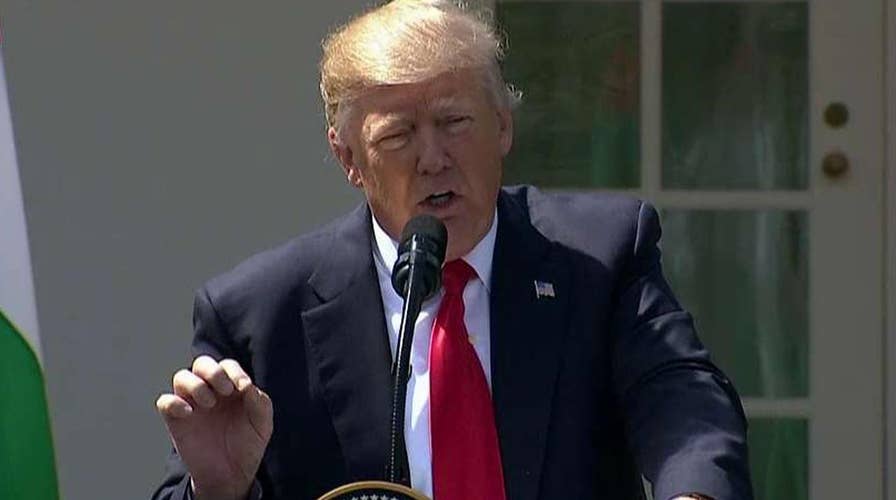Trump: Syrian crisis is 'now my responsibility'
President says former President Obama missed 'great opportunity'
Syrian President Bashar al-Assad’s probable use of a banned militarized chemical agent in Khan Sheikhoun, a rebel-held area in northwest Syria, is not only a tragedy for the more than 75 Syrians, including at least 20 children, murdered in the attack. It is President Trump’s first urgent national security test.
In a White House statement following initial reports of Tuesday’s attack, President Trump accused Mr. Assad, whom he has been tacitly supporting as the lesser of evils in the fight against the Islamic State, of conducting a “reprehensible act” that “cannot be ignored by the civilized world.”
The strike, he added in a gratuitous swipe at his predecessor, was the direct result of President Obama’s “weakness and irresolution,” that is, his failure to enforce the “red line” he drew against the use of chemical weapons by intervening militarily after a previous Syrian chemical strike in 2013.
To be taken seriously, Mr. Trump must now do more than rhetorically condemn “this intolerable attack.” He must show that he is not merely adept at tweeting tough, but prepared to force President Assad to stop committing war crimes and make him pay a price for having flaunted international law and his new administration’s sympathy for Syria’s struggle against militant Islam.
Make no mistake. While Syria has been dropping chlorine in “barrel bombs” over the past two years, this strike violates Mr. Assad’s commitment after his 2013 attack to abide by the treaty banning the possession and use of chemical weapons.
Under American and Russian pressure, Mr. Assad signed the 1997 Chemical Weapons Convention and gave up some 1,300 tons of deadly chemical weapons, the Arab world’s largest, deadliest CW stockpile, after as many as 1,400 people died when Syrian forces used a lethal neuro-toxin in the town of Ghouta in August, 2013.
While the United Nations and the Organization for the Prohibition of Chemical Weapons (OPCW) have not yet determined what Syria’s air force reportedly dropped from its aircraft Tuesday, it seems clear to us that the agent was an illegal weapon banned by the treaty – mostly likely sarin.
The use of sarin is a war crime, and a far more blatant violation of the treaty than the use of a toxic industrial chemical, like chlorine. The attack suggests, in turn, that Mr. Assad has either retained hidden stocks of the agent he supposedly turned over to international inspectors for destruction, or that Damascus is back in the business of secretly producing small quantities of the banned weapon. Either way, Mr. Assad is testing the new American president’s forbearance, not to mention his stated determination to restore U.S. leadership and respect for America throughout the world.
Although Mr. Trump and Nikki Haley, his U.N. Ambassador, have called Mr. Assad a “war criminal,” the president has also made clear that Washington accepts the need for Mr. Assad to stay in power, at least until the defeat of the Islamic State. But Mr. Trump’s decision to tolerate Mr. Assad’s rule, which effectively aligns Washington in Syria with Russia and Iran in the fight against ISIS, seems only to have emboldened Mr. Assad.
This must not stand.
If Mr. Trump fails to respond to Mr. Assad, what signal will be sent to President Kim Jong Un of North Korea, who launched yet another ballistic missile test in violation of U.N. resolutions and American warnings this week? Or to China, whose leader President Trump will try this week to cajole or pressure into doing more to reverse Pyongyang’s nuclear missile program, a direct threat to the U.S.?
President Trump has several options in Syria, none without great risk. One is military action against Syria’s air force – grounding the helicopters and fixed wing aircraft that are believed to have dropped the deadly agent – and the runways from which they operate. Yes, such strikes risk Russian casualties. But Moscow has consistently blocked U.N. action on Syria but proven unable to contain Mr. Assad’s bad behavior. And President Vladimir Putin would be forewarned. Grounding Syria’s air force, moreover, would help distance Mr. Trump from Mr. Putin, a politically useful benefit at this time.
While Mr. Trump mocked Mr. Obama for having failed to enforce his “red line” warning to Mr. Assad against the use of chemical weapons, Andrew Weber, the former assistant secretary of defense who supervised the removal and destruction of the bulk of Syrian’s deadly arsenal, notes that thanks to Mr. Obama’s preference for getting most of Assad’s chemical weapons out of Syria over military action, President Obama has bequeathed Mr. Trump an option he lacked. “There was no military option in 2013 to destroy, 1,300 tons of CW without dispersing deadly chemical agent and endangering large numbers of innocent civilians,” Mr. Weber said. “But with the CW stockpile removed and destroyed, a military option now exists.”
A second option would be to implement candidate Trump’s pledge to establish “safe zones” for long-suffering Syrian civilians caught up in Syria’s seven-year civil war with no end in sight. That would require the deployment of more American and foreign soldiers to secure such zones in what could be a dangerous, open-ended commitment. Such a move would be politically divisive at home and abroad.
Both options, as Mr. Trump is surely now discovering, are precarious, and, well, complicated. But resorting only to tough talk and tweets will send the very message of American vacillation and weakness that candidate Trump so vehemently condemned. President Trump must act now.

